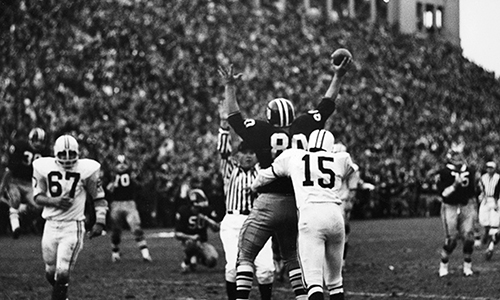Extra innings. Overtimes. Shootouts. Sudden death.
In sports, we feel the need to go for the kill, to designate a clear victor and an officially vanquished opponent. Headlines like “Harvard Beats Yale 29-29” are no longer celebrated; the draw has a decidedly negative connotation to it these days, a wholly unsatisfying consolation prize at the end of a hard-fought game.
In defense of draws

Extra innings. Overtimes. Shootouts. Sudden death.
In sports, we feel the need to go for the kill, to designate a clear victor and an officially vanquished opponent. Headlines like “Harvard Beats Yale 29-29” are no longer celebrated; the draw has a decidedly negative connotation to it these days, a wholly unsatisfying consolation prize at the end of a hard-fought game.
I have no desire to “kiss my sister,” as Navy football coach Eddie Erdelatz termed the feeling of earning a scoreless tie with Duke in 1953. But as that misguided mentality has blossomed into a mantra for many across the spectrum of team sports, it has resulted in the fetishization of wins and losses to the point where ties have become taboo.
Obviously, the draw has no place in the postseason—the entire point of a playoff bracket is to advance one team past another until only one remains. But in our increased drive to force a victory out of every result, we have denigrated the purpose of a contained athletic competition in many of our pastimes.
Overtime minutes and extended tiebreakers may add to the drama of a sporting event, but there are several reasons why a fan (or an athlete or a coach) should embrace the split result rather than fight to eradicate it.
Justifying the clock
When a sport is played within a specified block of time, it allows for three reasonable outcomes: One side wins, the other side wins, or the contest ends in a wash. The introduction of modifications like shootouts in hockey or the thoroughly convoluted overtime rules of the NFL reduces an entirely logical result—the draw—into gimmickry, solely for the sake of artificially enhancing the win-loss column.
Even in baseball, where the lack of a clock better justifies a concept like extra innings, ties were a regular occurrence until stadium lighting became widely used and games were allowed to stretch out past their scheduled window. When a sport is divided into quarters or periods or halves and a cap is set on the action, it is not only justifiable but honorable to determine a result within that time frame, or else there isn’t much point in structuring it that way in the first place.
Standardizing the season
Because of the various tweaks in regulation time in order to achieve a more easily relatable conclusion, some teams end up playing far more minutes than others by the end of a season, even though the wins (or losses) accumulated amount to the same. A triple-overtime win in the NBA awards an identical result to the victor as a rout in regulation; a shootout victory in the NHL earns an equal number of points as a win within three periods.
To cast the rules aside at the end of regulation because neither team is able to finish with the advantage requires either a suspension of reality on the part of the spectator or an ever-expanding succession of columns to delineate the nature of the outcome. In either case, it obfuscates a clear understanding of the result that is attainable within the provided regulation framework. By shoehorning a definitive outcome into every contest, we reward increasing elements of luck rather than a true measure of the quality of teams vying for playoff position.
Keeping players safe
Prolonging games until one side comes out ahead only increases the opportunities for injury among the athletes competing. As our awareness of the consequences of concussions and other serious sports-related injuries has increased, a reevaluation of this antagonistic stance toward draws should reasonably follow. With roster restrictions and salary caps in place, the implementation of overtime periods gratuitously puts players at more risk than is necessary.
For owners and general managers, those risks can put the team in both competitive and economic jeopardy. The loss of a star can have quantifiable detrimental results both on the field and in terms of gate receipts and merchandise sales. Fans who attach their vicarious emotions (and their fantasy rosters) to these athletes’ fortunes enjoy celebrating a win, but are less inclined to revel in Pyrrhic victories where the circumstances of today’s triumph can have adverse effects on potential future rewards.
In our quest to determine a victor at any cost, we put players’ health and well-being in jeopardy, render the game clock obsolete and threaten the balance and stability of the regular season. In light of all this, it would seem that the vilification of the humble stalemate has gone on far too long.






